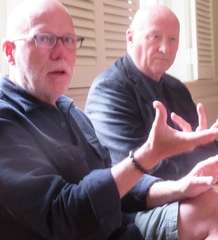|
Back
Ethereal Notes on Earthly Reverence Philadelphia
Presbyterian Church of Chestnut Hills
10/13/2019 -
Gavin Bryars: A Native Hill (World Premiere)
The Crossing, Donald Nally (Conductor)

D. Nally, G.Bryars (© Samuel A.Dog)
“Every shot in a movie is ideological.”
Sergei Eisenstein
“Eating is a political act.”
Wendell Berry
Gavin Bryars broke one serious rule in the world premiere of A Native Hill yesterday with his favorite choir, The Crossing. When the poetry fulfills itself, composers, no matter how fine, don’t need to gild those verbal lilies. Novelist Wendell Berry is more than fulfilling. And the poems from his early essay, A Native Hill were so overwhelming, in their consecration of the earth, in their realistic reverence for animals, in their uncrystalized relationship of heaven, deity and our planet, that it would seem that Mr. Bryars would have had a hard time improving them.
Yet the composer has performed miracles with the simplest words–look at his international masterpiece Jesus’ Blood Never Failed Me–so the deceivingly simple words of Wendell Berry were no problem.
Mr. Bryars admitted before the performance that “making a 75-minute piece for a capella choir was a crazy idea.” Yes his work with the Philadelphia-based The Crossing under Donald Nally had been such a joy for him before, that this work was offered as “a gift” to the group.
How did My Bryars handle Mr. Berry’s words? With enthusiasm, with a mélange of different styles, rarely taking the easy way of pictorialism, always giving graphic and unfettered emotional value to the thought expressed here.
First, he and the poet have an uncanny relationship to each other, an appreciation of each others’s genius, So when they both decided to turn the single essay A Native Hill into twelve sections, the logic seemed ineffable.
Thus, after the opening The Sense of the Poet, the work opened up with The Path, Sea Level, The Road, The Music of Streams...Animals and Birds...At Peace. Nothing was mawkish about these essays (more on that below), and nothing was mawkish about the music.

The Crossing
Mr. Bryars gave the 24-voiced The Crossing the most difficult music, which they handled deftly. We had complex harmonies in the slow-moving opening, with an equally complex moving verse when “The dog runs ahead...knowing the way we are about to go.” In Sea Level, a mundane title for a highly emotional section, The Crossing pictorially rose as “All our rains go in search (of sea level)” and fell as the rains are “departing”, having “carved out the land in a shape that is fluent and falling”.
Mr. Bryars is singular in his composition, but one had to compare him to Charles Ives in The Pool. Not for the tenor (almost counter-tenor) solo, but the dissonance, the fine-textured troubling singing as the water “cuts down to the bare rock a torrent after heavy rain, other times bone dry.”
Every section had its sometimes quirky always appropriate sounds, from the whistling and humming during the unbearably beautiful words of Animals and Birds to the massive cluster of all 24 voices–a Henry Cowell tone-cluster which modified to a deathly silence in the final At Peace.
This followed by almost a minute of silence by the audience.
A word on Wendell Berry. He has been called a “latter-day Thoreau”. But this is misleading. Thoreau was a meticulous painter of nature, and worked that into the ongoing Emersonan Transcendentalism of Concord, Massachusetts.
Wendell Berry needs no reason for his personal beliefs. He speaks knowingly of animals and birds. They usually dying violently, he admits, but speaks–also through observation–their “peace”, “when the creature rests, communes with himself, takes pleasure in being alive.” The writer affirms no religion, but notes The Road “beginingless and endless as God.”
And while death is part of Mr. Berry’s life, he cannot imagine Heaven. Admitting that heaven “is certainly more important than earth if all they say about it is true, it is still morally incidental to it and dependant on it, and I can only imagine it and desire it in terms of what I know of the earth.”
Kentucky farmer Wendell Berry knows much about the earth, just as Yorkshire composer Gavin Bryars knows his countryside. Together they have created a work of reverence, for earth, for the memorable feelings of music, and obviously for the friendship of two complementary spirits.
Harry Rolnick
|